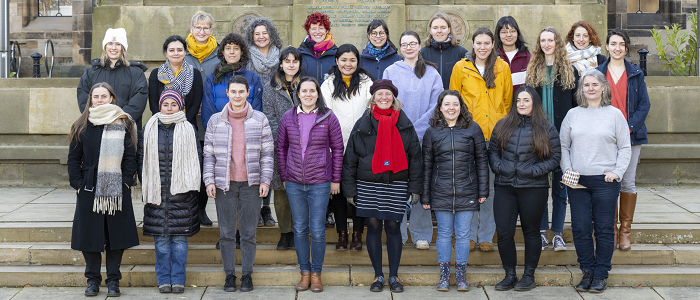
GES Career Stories
From issues including work-life balance, women’s career development opportunities and informal mentoring to academic promotions and education about gender, Athena Swan supports and benefits our staff and students.Kate Botterill
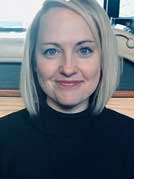
I joined GES in 2018 as a Lecturer in Human Geography. After completing my PhD at Newcastle University, I held two temporary post-doctoral research positions before securing a permanent position at Edinburgh Napier University in 2015, and then at Glasgow in 2018. My research on the feminist geographies of migration, security and minority youth equalities are very much connected to my values around equality and diversity. I am former co-chair the Equality and Diversity Committee in the School (E&D@GES) and curently in leave.
Being a woman in Higher Education
My career in higher education started rather late, after a brief adventure as a travelling musician. Coming ‘back’ to University after an unconventional departure and navigating oblique bureaucratic systems was a challenge. I have valued the support of some wonderful mentors and peers (women and men) from whom I have experienced a genuine sense of care and understanding as I traversed the craggy pathways towards a permanent position. These relationships have helped me to overcome and manage the challenges of precarious postdoctoral contracts, feeling like an imposter, juggling work-life balance and negotiating gendered and age-related hierarchies in departments. As our workloads get heavier, it is ever more important to make time for nurturing good colleague relationships. At the same time, I am acutely aware of my own privilege in access to opportunities and how systems of knowledge, recruitment, and progression produce inequalities in who arrives and who stays in higher education. There is much more work to do to address these intersectional inequalities and to make HE more diverse, inclusive and accessible to all.
How Athena Swan in GES has made a difference
My role as co-chair of E&D@GES urged me to think of new ways to broaden the School’s equalities remit in support of the vital, strategic work we are doing towards the retention of the Athena SWAN Silver award. The action-oriented approach of Athena Swan has made a real difference in terms of championing policies for flexible working, transgender rights, improving guidance on parental leave and post-doctoral mentoring. I have personally felt very encouraged by the School to take up flexible working due to adult family caring responsibilities and managing a long commute. As our equalities work broadens to address issues of race equality, LGBTQ+ and disability rights there is a lot more work for E&D@GES to do to improve staff wellbeing, work towards more inclusive institutional processes and embed equalities work in teaching and learning.
Dawn Bradshaw

My Background
I’ve been with GES since 2007. My role is to work partnership with Head of School, the School Executive and College Management to ensure the School activity is aligned with our strategic ambitions. I manage school finances and budgeting, contribute to strategy formation, advise and develop policy, manage and implement any changes to structure or service and sit on various University project boards. I feel proud to be part of GES and lucky to work with so many great colleagues who really care about the success of the school and welfare of students and staff.
Being a woman in higher education
I am a woman working in higher education who has experienced excellent relationships with colleagues at all levels and job families. As a member of professional staff I notice a higher proportion of women in administration roles at certain levels, and more males at senior levels. I am keen to get involved in development of all professional staff to ensure we all have an equal opportunity to apply for promoted positions.
What Athena Swan in GES means to me
I am the professional staff representative on the SAT and current chair of the Data Acquisition group. Athena Swan has certainly created lively discussions about issues that have always been evident, but are now more recognized at a local level. For example, the dearth of opportunity and development for certain job families was just accepted, even though a major issue for lots of employees. Now, through Athena Swan, this issue will hopefully be addressed at University level, as there needs to be a new development framework for professional staff. I believe that all staff who play a part in the success of the School/College/University should be valued, developed, appreciated and rewarded accordingly, and I hope Athena Swan is the vehicle for that change. More so, I want to be part of a team that makes GES a great place to work, for all.
Emma Laurie
My Background
I first arrived in GES as a 'fresher' undergrad in 2004 and have never quite got around to leaving. I stayed on to undertake postgraduate research and I was awarded my PhD, entitled ‘The Embodied Politics of Health in Dar es Salaam’, in December 2014. I was a GTA throughout my PhD and during the final year of my PhD, I became a part-time Teaching Assistant in GES, and continued in this position after I was awarded my PhD. I really enjoyed the teaching element and decided to pursue this track over pursing post-doc work and, in November 2015, I was appointed as 'University Teacher' in a full-time capacity. The title of 'University Teacher' later changed to 'Lecturer (on Teaching and Scholarship Track)', a move I saw as incredibly important and demonstrated the Universities commitment to teaching and also ensured a clearer career trajectories for those on that track. While on the 'teaching track', I was always made to feel a real member of the HGRG community and was supported to keep my toe in the proverbial research waters. In the end, I fell back in love with research after a period of post-PhD research fatigue, and after successful involvement in interdisciplinary grants, I was supported to 'change track' and in January 2019 I became a 'Lecturer (on the Research and Teaching Track)'.
Being a woman in Higher Education
As an early career researcher, I am undoubtedly lucky to be in academia at a time when gendered attitudes are changed, changing, or, at the very least, able to be challenged. I'm also very aware of relative privilege to other women based on other markers of my identity. I've had a whole host of role models to look up, from those only a few years ahead in their career to those more senior. The old adage 'you can't be, what you can't see' rings true, and I've been lucky enough to 'see' numerous women ahead of me, and again I think this is where we need more conversations about intersectionality in academia with regards to race, disability and illness and such like. It has been frustrating to see so many female peers exit academia after PhDs because the precarious working environment hasn't been conducive to their want to start a family - the thought of years on short term contracts with limited or no maternity rights has been too off-putting and academia is losing incredible talent as a result.
How Athena Swan in GES has made a difference to me
I feel Athena Swan has crafted a platform for far more honest conversations to take place regarding academia as a place of work (regardless of gendered identities). While many of the most problematic elements of academic work are systemic, which limits the change that any single collective can have, the very fact it continues to foster a more open environment to discuss concerns, frustrations, or anxieties associated with pursuing an academic career is helpful. There have also been some really helpful and practical sessions around things such as promotions.
John MacDonald
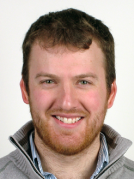 My background
My background
After graduating with a first class BSc honours degree in Earth Science from the University of Glasgow, I studied for a PhD at the University of Liverpool on the chemistry of ancient rocks in north west Scotland. I was then a postdoctoral research associate at Imperial College London for two years, investigating the potential for using novel geochemical methods to understand the thermal histories of oil reservoirs. I joined GES as a Lecturer in Earth Science after this in March 2015.
How Athena Swan in GES has made a difference to me
I first became aware of Athena Swan during my postdoc when I was asked by the SAT to chair an open-floor discussion on career progression for postdocs. I was already aware that this level in the academic ladder could be particularly challenging in terms of career progression. The constant worry about finding the next short-term postdoc position can also have an effect on physical and mental wellbeing. This event made me aware that through Athena Swan, HEAs are moving to deal with these pressure points and make the workplace as accommodating as possible for all. I became part of the GES SAT soon after joining the School. Participation in this committee has broadened my awareness of the issues affecting work-life balance for all University staff.
Cheryl McGeachan
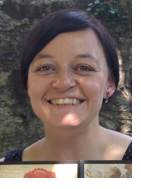 My background
My background
I came to the University of Glasgow in 2001 to begin my undergraduate degree in Geography and Scottish Literature where my interests into ideas around psychiatry, trauma and mental ill-health were awakened. Interested in exploring the ideas of Scottish mental ill-health further, I then undertook the MRes in Human Geography and PhD (ESRC-funded) in the School. My PhD research examined the geographical biography of Scottish psychiatrist R.D. Laing and the many worlds of mental ill-health. Since my PhD, I have worked as a University Teacher and was recently appointed as a Lecturer in 2015. I see my teaching and research as inextricably linked, especially through my Honours Option entitled Historical Geographies of Care, Conflict and Confinement.
Being a woman in higher education
Despite not leaving the University of Glasgow, my career has taken a number of unexpected directions. Taking the University Teacher post enabled me to explore a variety of new terrains in my teaching and scholarship. As a University Teacher, I was introduced to a number of influential women scholars in Learning & Teaching who encouraged me to develop my leadership qualities and gave me the confidence to take on key challenges, such as developing and convening the Geography Summer School (with Dr Larissa Naylor). In my new position as a Lecturer in Human Geography, I feel the relationships formed with the School and wider university are central to my own development. Within GES there are a number of women in senior positions and I find this is inspiring and encouraging.
How has Athena Swan in GES made a difference to me?
The awareness of support and provision available to develop careers has been an invaluable part of the Athena Swan action in GES. A number of key events have highlighted the importance of sharing knowledge surrounding issues of mentorship, promotions and work/life balance. The supportive atmosphere promoted in GES by the Athena Swan activities has improved my confidence as an early-career scholar and has made me aware of a range of provision that I can access to develop my career. Importantly, however, it has also strengthened my network of support within the university and has inspired me to make more contact with my peers.
Larissa Naylor
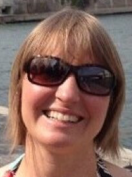
My background
My career history has been quite like a patchwork quilt where I have woven in and out of academia to work as a specialist environmental scientist (geomorphologist), alongside my husband’s academic career. This journey has taken me from a D. Phil at Oxford to a NERC Research Fellowship at the Tyndall Centre for Climate Change Research at the University of East Anglia, then into roles in Environmental Consultancy and the Environment Agency. before returning to academia in 2007 as a research, teaching and administrative fellow at the University of Exeter. I took up my first lectureship at the University of Glasgow in 2014, received a NERC Knowledge Exchange Fellowship in 2015, and was promoted to Reader in 2018. In 2020, I was thrilled to be promoted to Professor—especially in the middle of the pandemic! In 2025, was rezoned within the professoriate. I'm proud to be a living example of the University of Glasgow’s commitment to closing the gender pay gap.
Being a woman in higher education
Like many others who balance dual academic careers, I haven’t followed a traditional path. Moving in and out of academia to support both mine and my husband’s careers has brought challenges. Initiatives like Athena Swan have done a lot to address these barriers, but there’s still more work to do.
I’ve been lucky to be part of some innovative efforts to support women scientists. For example, I co-shared an associate editor role at a leading journal with another female academic. It was a new approach for the journal and publisher, and it worked really well—providing both flexibility and recognition while I was working part-time. In 2018, I was honoured to receive the Gordon Warwick Award for my contributions to Geomorphology—only the fourth woman to win it in the award’s 31-year history. Both this and my editorial role were important indicators of esteem and helped me secure my promotion to reader. Throughout my career it has been an absolute pleasure to mentor my students, especially so for those from non-traditional backgrounds or from underrepresented groups, and to help them to flourish after graduation to start their careers. I am delighted to be part of two initiatives that supports inclusion in engineering and physical sciences, on the management team of a new inclusive doctoral training programme, called DiveIN and as a co-investigator of a network designed to support engineering practices that help address climate change and its impacts on women, children and underrepresented groups globally called FeME.
How Athena Swan in GES has made a different to me
GES and the University of Glasgow have been incredibly supportive throughout my academic journey. The school’s flexibility around part-time work has been especially valuable, allowing me to balance my professional and personal life. This culture of flexibility and willingness around the ‘work and life juggle’ makes GES and University of Glasgow a great place to work. I’m also thankful for the mentoring and support from senior female colleagues who have helped broaden my research profile internationally and encouraged leadership development, including opportunities to shadow senior academics. The Athena Swan initiative, and the staff who worked so hard to implement these actions in GES, have really improved my work-life balance. I’m very grateful for this.
In 2023, I moved from being a beneficiary of Athena Swan to leading our Silver renewal application process together with a great team of people. Being chair of the Equality Diversity and Inclusion (EDI) committee has allowed me to see first-hand the wonderful efforts that so many staff and students are making to collectively improve the inclusivity for all staff and student groups at work and study in GES. I am personally learning a lot in this rewarding role, and I am grateful for the opportunity to work to understand and contribute to co-creating a more equitable academic community for all to study and work in.
Hester Parr
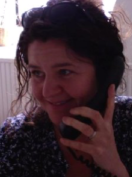 My career story
My career story
I am Professor of Human Geography in GES and my research interests in mental health, embodiment and creative practices have been nurtured in the stimulating environment of the Human Geography Research Group (HGRG) of GES. I joined GES as a Reader in 2009, after starting my career at Dundee University. I worked part-time for the first 4 years of my time here and was promoted to a Professorship in 2015.
Being a woman in higher education
At several stages during my career the institutional context where am I based has changed its process and procedures in relation to women, gender and equality issues. I have welcomed these moments as progressive. I have always been aware of the engrained masculinities of the academy (performances not always produced by men) and it is still a challenge to work in a context where stereotypical masculine characteristics are valued (unconsciously and otherwise) as ‘the norm’. I have been lucky to have been supported, mentored and befriended by both men and women who have inspired me to continue working in academia. I am now in the position of supervising postgraduate students and being a mentor to other women in the workplace. I hope that my career story helps them to believe that higher education can be inclusive of different kinds of women from a range of backgrounds.
GES appointed me from a period of maternity leave and was flexible in agreeing to an initial part-time contract in order so that I could spend more time with my son when he was very young. While I think universities can manage part-time academic workers much better than they do, I have also benefitted from this flexibility and from standout moments of understanding from some of my colleagues. I am now a full-time member of staff but often try to advocate for part-timers where possible.
How Athena Swan in GES has made a difference
I have valued Athena Swan as a vehicle through which we are required to openly discuss gender politics, relations and work-life balance issues. I have always stood by our local by-line: ‘What is good for women is good for everyone’.
I was pleased to be part of the team that was awarded a Silver, as it meant that our local efforts were recognised, although I had critiques about the data-heavy process and administration of Athena and the workload for those involved. Nonetheless, I think we have collectively produced real cultural change in our workplace and given a voice to the views of very different people in GES. I am proud of our work but think we have still some way to go to be fully inclusive to all staff and student groups in terms of their (non) gender identities and range of lived experience.
I am personally always learning how to be a better colleague and how to be more sensitive to other people's rights, needs and preferences in the workplace.
Jaime Toney
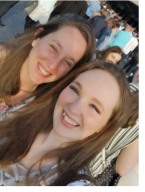 I am a Professor in Environmental and Climate Science in GES and Director of the Centre for Sustainable Solutions. My research focuses on taking transdisciplinary, systems approaches to climate-related challenges, for example, on the GALLANT project. I started at the University of Glasgow as a NERC-funded postdoctoral research associate in GES in April 2011 just before receiving my PhD from the Geosciences Department at Brown University in the U.S. I successfully applied for a Lectureship in GES that started in March 2013. I began building my research group and to my excitement was awarded a prestigious ERC Starting Grant (April 2015). I was promoted to Senior Lecturer in August 2016, and since then have been expanding my research group, my laboratory’s capacity and capabilities, as well as, performing research-led teaching. I was promoted to Professor in August 2018 and have taken on a number of leadership roles within the School, including Director of Research and overseeing our Research Excellence Framework Submission in 2021. At the university level, I lead the Sustainable Futures focus area for Glasgow Changing Futures a programme to harness the research strengths, creativity, collaborative spirit, and dedication of staff, students, and partners to address the societal challenges.
I am a Professor in Environmental and Climate Science in GES and Director of the Centre for Sustainable Solutions. My research focuses on taking transdisciplinary, systems approaches to climate-related challenges, for example, on the GALLANT project. I started at the University of Glasgow as a NERC-funded postdoctoral research associate in GES in April 2011 just before receiving my PhD from the Geosciences Department at Brown University in the U.S. I successfully applied for a Lectureship in GES that started in March 2013. I began building my research group and to my excitement was awarded a prestigious ERC Starting Grant (April 2015). I was promoted to Senior Lecturer in August 2016, and since then have been expanding my research group, my laboratory’s capacity and capabilities, as well as, performing research-led teaching. I was promoted to Professor in August 2018 and have taken on a number of leadership roles within the School, including Director of Research and overseeing our Research Excellence Framework Submission in 2021. At the university level, I lead the Sustainable Futures focus area for Glasgow Changing Futures a programme to harness the research strengths, creativity, collaborative spirit, and dedication of staff, students, and partners to address the societal challenges.
Being a woman in higher education
There have certainly been challenges to being a female in a largely male-dominated STEM field, however, I was fully unaware of these during my undergraduate studies in Geology and Biology, as well as, during my Master’s studies in Quaternary Sciences. This was largely due to very passionate and supportive supervisors (both male), who were excellent mentors and role models. I completed my MSc degree in 2004 as a single mother of an 18-month old daughter and enjoyed the flexible hours of an academic lifestyle. During my PhD studies, I first became aware of inequities in the academic system caused by both unconscious bias and direct discrimination and became an advocate for gender equality in the STEM disciplines through my role as the Graduate Liaison for WiSE (Women in Science and Engineering). I continue to be committed to networks, such as the Earth Science Women’s Network. I was a founding member of the Athena SWAN self-assessment team since it started our School in 2012 until 2017 and provide both formal and informal mentoring to many male and female colleagues.
How Athena SWAN in GES has made a difference to me
Creating the Self-Assessment Team to undergo a thorough analysis of our School was a positive experience that revealed a number of strong, collegiate best practices that GES already engages in, but also identified areas that needed actions to create a better, more equitable working environment. I found it rewarding to be part of this team that genuinely investigated ways to improve our working environment and culture for everyone.
Personally, I was paired with an excellent male mentor through the University-level Athena SWAN program, who provided excellent career advice and encouraged me to be more accountable for my own successes. Without this mentoring and encouragement, I would not have applied for promotion to Senior Lecturer at the time that I did, nor achieved promotion at the level I applied for. While I have passed on the torch to successive Equality and Diversity teams within the School I remain interested and actively engaged with these efforts at multiple levels in academia – most recently as chair of the NERC Opening Up the Environment funding panel, which oversaw funding decisions on a call to increase, support and sustain diversity of representation to attract a wider talent pool to create the future environmental sciences workforce through partnerships.
(Image: Professor Toney with her 17-year old daughter, 2019)

